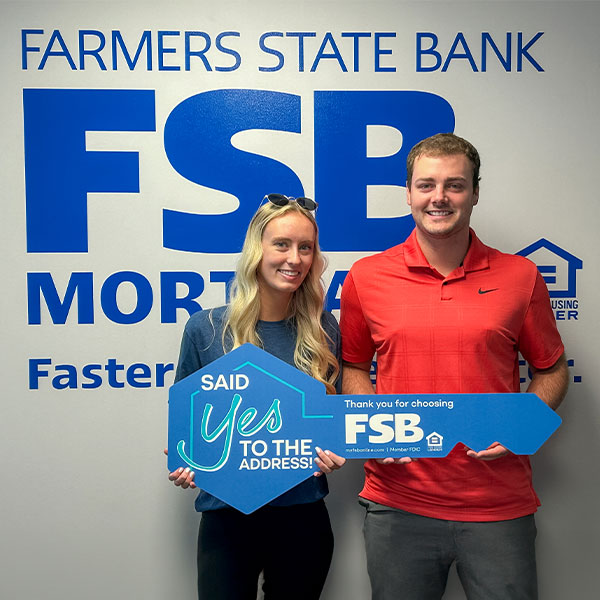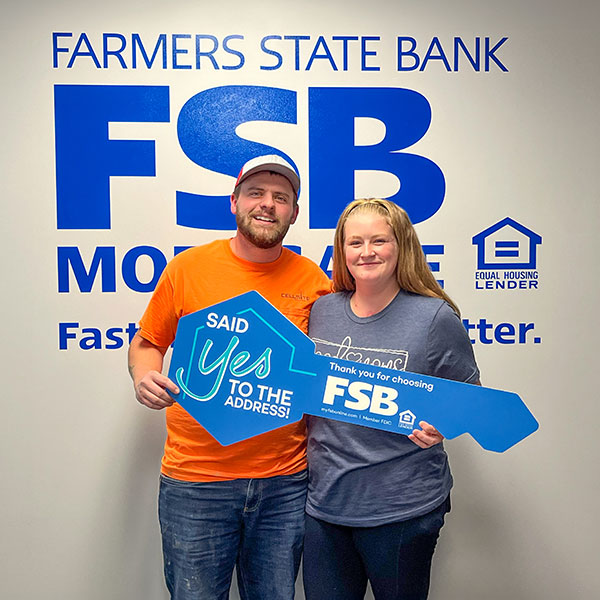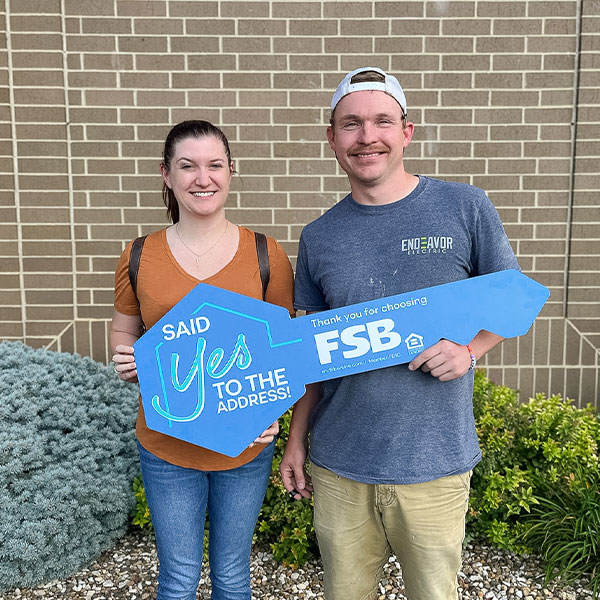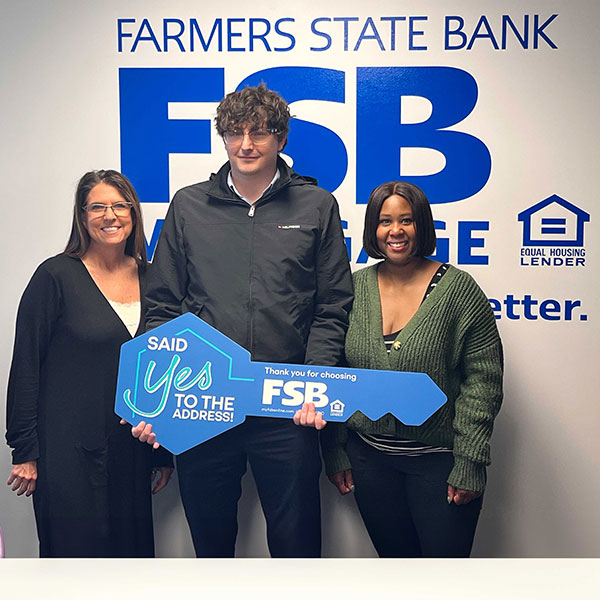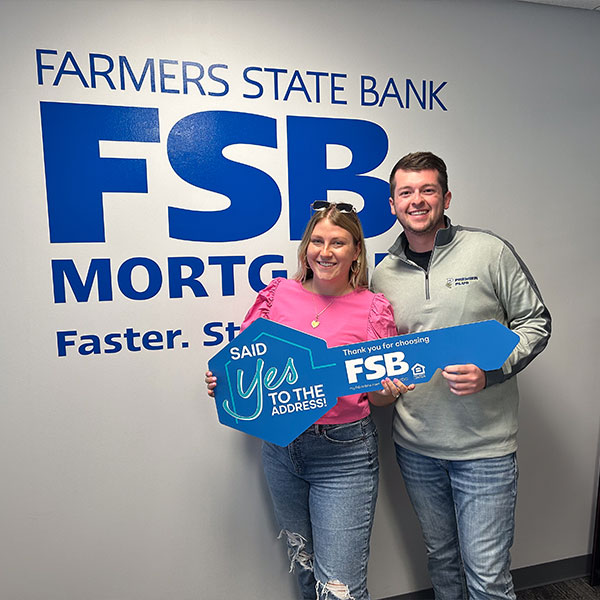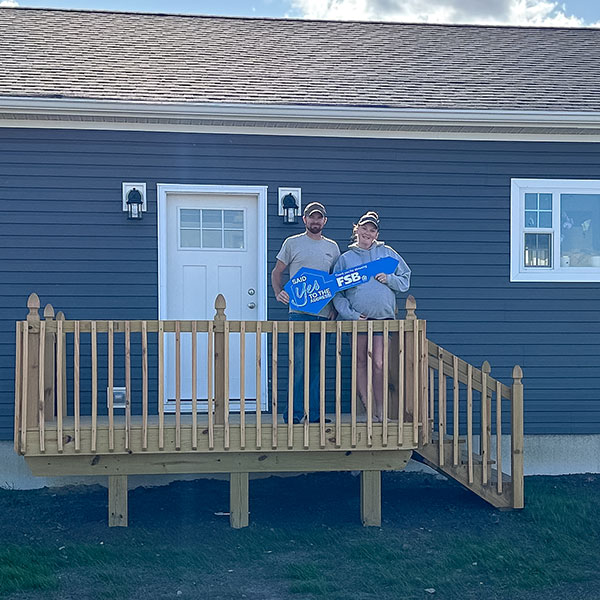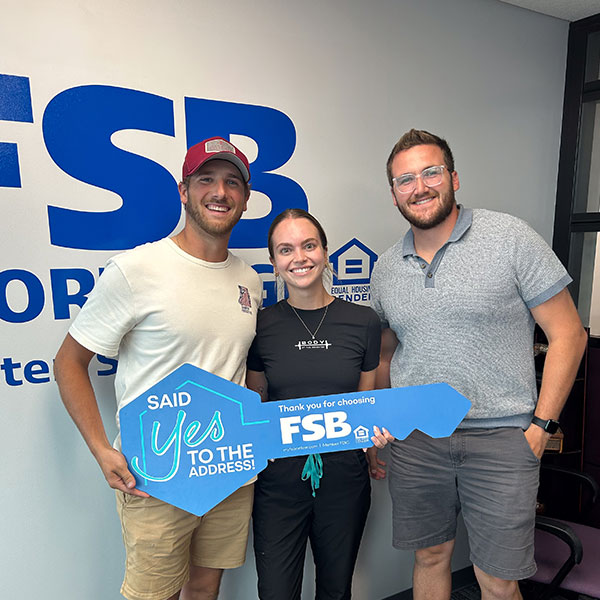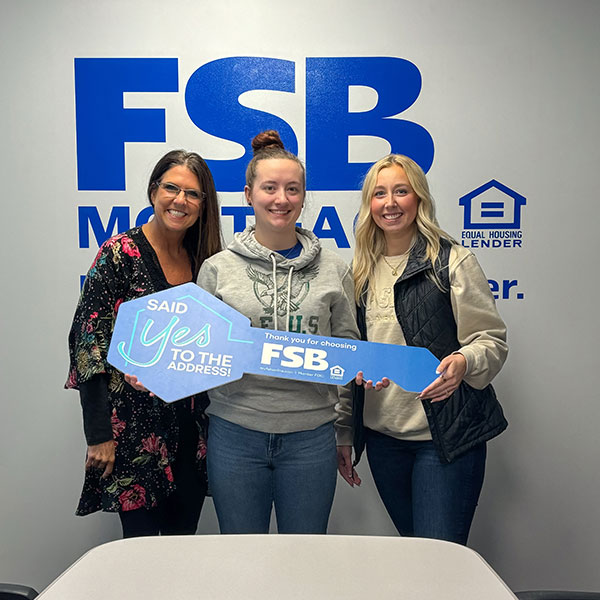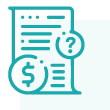

Make Your First Home a Reality
Are you a first-time homebuyer in Iowa? FSB helps you qualify for grants, choose the right mortgage, and navigate the process with local support. From exclusive mortgage programs to grants that reduce your upfront costs, our local team is here to guide you every step of the way.1
Start My ApplicationRequest Assistance
Programs & Grants for First-Time Iowa Homebuyers
Explore first-time homebuyer programs designed to help reduce upfront costs & make homeownership more affordable.
FHLB Home$tart Grant
2026 Funds Are Available!
The Home$tart Program offers up to $15,0002 in down payment assistance to qualifying homebuyers earning up to 80% of the median income for their area, based on Iowa HUD Income Limits adjusted for household size.
Additional Eligibility Requirements:
- Have not owned a home in the past three years
- Completion of a homebuyer education class
- Qualification for a mortgage loan with FSB1
- Becoming an FSB Customer
Ready to Start the Mortgage Process?
Apply online1 or contact a lender for guidance on grant availability and eligibility.
Iowa Finance Authority Grants
The Iowa Finance Authority offers two programs designed to assist homebuyers with down payment and closing costs when used alongside the FirstHome or Homes for Iowans mortgage programs.
FirstHome Plus Program
The FirstHome Plus Program is available to eligible first-time homebuyers who are purchasing a primary residence in Iowa.
Homes For Iowans Plus Program
Available to both first-time and repeat homebuyers, the Homes for Iowans Program supports the purchase of a primary residence in Iowa.
Ready to Take the Next Step?
Apply online1 today or contact a lender to see how you can benefit from these programs.
Military Down Payment & Closing Cost Assistance
The Military Homeownership Assistance Program is available annually to support service members, veterans, and their families for down payment and closing costs on a qualifying home purchase.
Eligibility Requirements
- Have served 90 days active duty between August 2, 1990 and April 6, 1991 or September 11, 2001 to present. Active duty needs not be consecutive; it may be cumulative; or
- Is a federal status injured service person having served in active duty between August 2, 1990 and April 6, 1991 or September 11, 2001 to present; or
- Is a surviving spouse of said eligible service person, all who have had a discharge other than dishonorable
Please contact FSB's Mortgage Department directly to check if funds are currently available for this year.
Ready to Get Started?
Start your application online1 today or contact a lender for more information on how this program could help you.
Cedar Rapids First-Time Homebuyer Programs
The City of Cedar Rapids offers the First-Time Homebuyer (FTHB) Program, providing forgivable loans to assist with down payment costs for eligible households.
Eligible Homeowners Will Meet the Following Requirements:
- Be a first-time homebuyer
- Be income eligible — including income, assets, and debt ratio calculations
- Secure acceptable mortgage financing & purchase an eligible property
Eligible Properties Will Meet the Following Requirements:
- Homes must be within the City of Cedar Rapids limits (Outside the 100-year flood plain)
- Homes must be owner-occupied or vacant (Rental property & mobile homes are not eligible)
- Homes will be inspected by City staff and must comply with Housing Quality Standards (based on health and safety requirements)
Ready to Become a Homeowner in Cedar Rapids?
Apply online1 today or contact a lender for more information on potential grant eligibility.
FHLB Home$tart Grant
The Home$tart Program offers up to $15,0002 in down payment assistance to qualifying homebuyers earning up to 80% of the median income for their area, based on Iowa HUD Income Limits adjusted for household size.
Additional Eligibility Requirements:
- Have not owned a home in the past three years
- Completion of a homebuyer education class
- Qualification for a mortgage loan with FSB1
- Becoming an FSB Customer
IFA Grants
The Iowa Finance Authority offers two programs designed to assist homebuyers with down payment and closing costs when used alongside the FirstHome or Homes for Iowans mortgage programs.
FirstHome Plus Program
The FirstHome Plus Program is available to eligible first-time homebuyers who are purchasing a primary residence in Iowa.
Homes For Iowans Plus Program
Available to both first-time and repeat homebuyers, the Homes for Iowans Program supports the purchase of a primary residence in Iowa.
Military Down Payment & Closing Cost Assistance
The Military Homeownership Assistance Program is available annually to support service members, veterans, and their families for down payment and closing costs on a qualifying home purchase.
Eligibility Requirements
- Have served 90 days active duty between August 2, 1990 and April 6, 1991 or September 11, 2001 to present. Active duty needs not be consecutive; it may be cumulative; or
- Is a federal status injured service person having served in active duty between August 2, 1990 and April 6, 1991 or September 11, 2001 to present; or
- Is a surviving spouse of said eligible service person, all who have had a discharge other than dishonorable
Please contact FSB's Mortgage Department directly to check if funds are currently available for this year.
Cedar Rapids First-Time Homebuyer Programs
The City of Cedar Rapids offers the First-Time Homebuyer (FTHB) Program, providing forgivable loans to assist with down payment costs for eligible households.
Eligible Homeowners Will Meet the Following Requirements:
- Be a first-time homebuyer
- Be income eligible — including income, assets, and debt ratio calculations
- Secure acceptable mortgage financing & purchase an eligible property
Eligible Properties Will Meet the Following Requirements:
- Homes must be within the City of Cedar Rapids limits (Outside the 100-year flood plain)
- Homes must be owner-occupied or vacant (Rental property & mobile homes are not eligible)
- Homes will be inspected by City staff and must comply with Housing Quality Standards (based on health and safety requirements)
First-Time Homebuyers Love FSB
These homebuyers partnered with FSB to make it happen. You can too. Just apply online to get started!1
Getting Started with an FSB Mortgage in Iowa
Start Your Application1
Apply online or submit a quick form, and we'll be in touch to guide you through the process.
Get Preapproved
We’ll review your credit, income, and finances to determine how much home you can afford.
Shop for Homes
With your preapproval in hand, you’re ready to work with a realtor and make serious offers.
Ready to Buy Your First Home in Iowa?
Use this simple checklist to guide you through the process and feel confident about your next steps.
- Are You Financially Ready?
- Check Your Debt‑to‑Income
- Plan Your Down Payment
- Boost Your Credit Score
- Determine What You Can Afford
- Preparing Your Documents
- Get Preapproved
FAQs: First-Time Homebuyers in Iowa
Find answers to the most common questions from first-time homebuyers in Iowa.
Who qualifies as a first-time homebuyer?
In Iowa, a first-time homebuyer is an individual who has not owned a primary residence in the past three years. This can also include buyers who previously owned a home but have not paid mortgage interest during that time. Many programs have income limits, so contact an FSB lender to determine which options you qualify for.
What assistance does FSB offer for first-time homebuyers in Iowa?
FSB offers access to various grant programs1 for First-Time Homebuyers in Iowa, including:
-
The FHLB Home$tart Grant Program, providing up to $15,0002 for down payment assistance.
-
The IFA FirstHome Plus Program, designed to help with down payment and closing costs for primary residents in Iowa.
-
The Military Homeownership Assistance Program for veterans, service members, and their families
-
The City of Cedar Rapids Assistance Program, providing forgivable loans to assist with down payment costs for eligible households in Cedar Rapids.
Explore Your Options
Discover programs that can help with the cost of buying a home or contact a lender for personalized guidance.
Explore Mortgage Grants Contact FSB's Mortgage Team
Why is my credit history important for buying a home?
Credit history is important because it shows lenders how you make payments, manage credit, and handle debt.
Timely monthly payments, responsible credit management, and a clean history free of missed payments or bankruptcies signal to lenders that you're a trustworthy borrower.
However, if your credit has a few blemishes, there are loan programs available for borrowers with less-than-perfect credit.
How can I improve my credit score before applying for a mortgage?
Improving your credit score can significantly reduce interest costs on your home loan. Here's how you can improve it:
-
Make small purchases with your credit card while keeping usage at 30% or less of the credit limit
-
Ask for a higher credit limit to lower overall utilization
-
Don't close your old credit cards, just don’t use them anymore
-
Pay your bills on time, and let any balance hit the statement first
Be patient; some credit blemishes can only be repaired with time.
What do I need to get preapproved?
To get preapproved for a mortgage, you'll need:
-
Last two pay stubs with year-to-date income
-
W-2 forms & possibly tax returns from the previous two years
-
Two months of bank statements (all pages & assets)
-
Other income & loan documentation showing the amount and source
How do I determine how much home I can afford?
Determining how much you can afford comes down to comparing income to housing costs:
-
Lenders consider home expenses like principal, interest, taxes, private mortgage insurance (PMI) + HOA (Homeowners Association) dues, if applicable
-
Lenders won't consider personal bills like utilities, phone, etc.
Generally, aim to keep housing costs below 36% of your gross income.
Get a Head Start!
What is private mortgage insurance (PMI)?
Private Mortgage Insurance (PMI) is an additional insurance policy included in a monthly mortgage payment if the down payment is less than 20% of the home's purchase price.
It is an added protection for the lender, not for the buyer. This premium is based on the risk of the loan. The riskier the loan, the higher the premium.
What is included in closing costs?
Beyond the down payment and purchase price, closing costs cover additional fees for securing the new home.
Expect to Pay For:
-
Loan processing fees
-
Home Appraisal
-
Credit report fees
-
Flood certifications
-
Title work
-
Potential inspections
-
Pre-paid homeowner's insurance (1-year)
-
Reserve account (escrow) for taxes and insurance
While it might seem overwhelming initially, remember your lender is there to guide you through every step before you submit an offer.
Buy Your First Iowa Home with FSB
See if you qualify for down payment assistance! Contact FSB's Mortgage department at 319-730-6990 or fill out the form below to start the process.
Mortgage Calculators for First-Time Iowa Homebuyers
Estimate costs, plan your budget, and more with these helpful tools.

Buying a home doesn’t have to break the bank. Discover grants and assistance options available to you.


